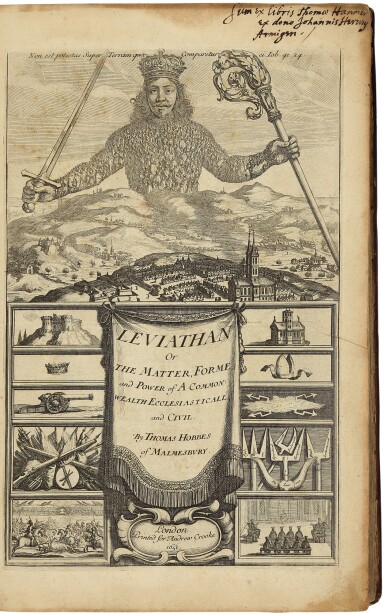Fine Books and Manuscripts, Including the Olympic Manifesto
Fine Books and Manuscripts, Including the Olympic Manifesto

HOBBES, THOMAS | Leviathan, or The Matter, Forme, & Power of a Common-Wealth Ecclesiasticall and Civill. London: Printed for Andrew Crooke, at the Green Dragon in St. Pauls Church-yard, 1651
Auction Closed
December 18, 08:58 PM GMT
Estimate
15,000 - 20,000 USD
Lot Details
Description
HOBBES, THOMAS
Leviathan, or The Matter, Forme, & Power of a Common-Wealth Ecclesiasticall and Civill. London: Printed for Andrew Crooke, at the Green Dragon in St. Pauls Church-yard, 1651
Folio (280 x 185 mm). Engraved allegorical title by Abraham Bosse, letterpress title with woodcut "head" ornament, 1 folding letterpress table, contemporary inscriptions to free front endpaper and engraved title. Scattered foxing and browning, binder's instructions partially visible on letterpress table, two small marginal losses to G1, small loss to S4 affecting four words, and Tt4 affecting 2. Blind-ruled contemporary calf, spine gilt in six sections; extremities a bit rubbed, rebacked, hinges reinforced with linen.
First edition, Royalist Sir Thomas Hanmer's copy
Hobbes' masterpiece of political theory formed on the experience of the English Civil War, in which the State is seen as an artificial monster to which individuals submit for their own survival. "This book produced a fermentation in English thought not surpassed until the advent of Darwinism. Its importance may be gauged by the long list of assailants it aroused. It was placed on the Index Librorum Prohibitorum 7 May 1703, though all Hobbes's works had previously been condemned in toto, and it still remains a model of vigorous exposition, unsurpassed in the language" (Pforzheimer).
Sir Thomas Hanmer, second baronet (1612–1678) was born on 4 May 1612, the son of Sir John Hanmer, first baronet (d. 1624). Following the premature death of his father in 1624, Hanmer inherited the baronetcy the former had gained in 1620. In or before 1642 Sir Thomas was serving as a cup-bearer to Charles I, and on the outbreak of civil war he was appointed a commissioner of array for his county, with responsibility for raising a band of archers and a dragoon regiment. His property was raided more than once by Parliamentarian soldiers, and on 15 May 1644 he obtained leave to go to France with his family. (DNB)
REFERENCE:
Macdonald & Hargreaves 42; Pforzheimer 491; PMM 138; Wing H2246
PROVENANCE:
Henry Hanmer — Sir Thomas Hanmer, 2nd Baronet (contemporary gift inscription, 1650) — Johannis [John] Hervey, (contemporary gift inscription) — Sir Thomas Hanmer, 4th Baronet (armorial bookplate, 1707) — John Hanmer (armorial bookplate, 1834) — Sotheby's London (21 October 1957, Lot 387) to Charles Traylen — Private collection — by descent to the present owner
